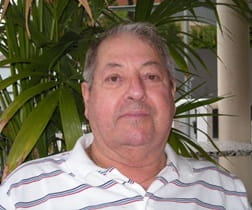 In June 2011 79-year old William Hopkins (pictured) was admitted to Nevill Hall Hospital in Abergavenny, South Wales, for a routine right knee replacement operation. The surgery itself was uneventful and he came out of theatre in good spirits. However, immediately following a two-hour blood re-infusion procedure Mr Hopkins complained of feeling sick, became short of breath and started losing consciousness. It was later discovered that he had suffered a stroke, resulting in considerable brain damage including left hemiplegia.
In June 2011 79-year old William Hopkins (pictured) was admitted to Nevill Hall Hospital in Abergavenny, South Wales, for a routine right knee replacement operation. The surgery itself was uneventful and he came out of theatre in good spirits. However, immediately following a two-hour blood re-infusion procedure Mr Hopkins complained of feeling sick, became short of breath and started losing consciousness. It was later discovered that he had suffered a stroke, resulting in considerable brain damage including left hemiplegia.
The hospital’s procedure for re-infusing Mr Hopkins’ own blood following the knee replacement surgery was found to be in desperate need of review, having had disastrous consequences for the previously mobile, active and independent Mr Hopkins. Before the operation he still drove a car, enjoyed gardening and was an enthusiastic member of the local bowls club.
An autologous blood transfusion is the re-infusion of a patient’s own blood collected during surgery, different from an allogenic blood transfusion where blood from unrelated or anonymous donors is used. An autologous blood transfusion is considered to carry fewer risks, however the hospital’s own investigations revealed that there had been no retrograde priming of the blood prior to the transfusion and that there had been air present in the pressure bag and transfusion line, the likely cause of Mr Hopkins’ stroke.
In the weeks and months that followed, Mr Hopkins’ condition deteriorated to the point where he was no longer able to take care of himself and his mood and personality were affected. His family witnessed a change from him being well-mannered, caring and jovial to aggressive, confused and sometimes even violent, as a consequence of the damage he sustained to the frontal lobe of his brain. His and his family’s lives were changed forever.
Mr Hopkins’ family struggled to cope with his significantly increased care needs after his discharge from hospital. They were left with no option but to place him in private residential care. Mr Hopkins eventually died on 8 May 2014, 3 years after the injury, having battled with recurring bouts of pneumonia.
The Hopkins family, represented by Mr Hopkins’ son Gareth, approached Shoosmiths for help in investigating the cause of his father’s stroke and subsequent deterioration. They were concerned not only with the care their father received following his knee replacement, but also with what they considered to be generally poor care provided by the hospital during Mr Hopkins’ many re-admissions.
Mr Hopkins sadly passed away during the course of our investigations and we therefore assisted Gareth in obtaining a Grant of Letters of Administration so he could manage his late father’s estate and continue the claim against Aneurin Bevan University Local Health Board, the body responsible for the care the late Mr Hopkins received. The expert medical evidence we obtained suggested that the failure to undertake retrograde priming as well as the presence of air in the bag, combined with the pressure applied to speed up the rate of infusion caused air to be administered via the infusion line into Mr Hopkins’ blood stream, resulting in the stroke.
The solicitor who handled the case, Kishma Bolaji, explains:
‘In this case we were able to establish that the failure to properly prepare and carry out the blood transfusion was attributable to inadequate training of staff. The nurse who was tasked with the re-infusion was not suitably trained to do so. The rate of transfusion was also far too high and by allowing air to remain in the bag and the line the risk of a cardiac embolism was heightened, leading to the devastating consequences Mr Hopkins suffered.’
A Letter of Claim was served on the Defendant Health Board in response to which they admitted liability and apologised for the standard of care Mr Hopkins received. Following a period of negotiation, compensation was agreed for Mr Hopkins’ pain and suffering and funeral and other expenses stemming from the negligence.
The Hopkins family were pleased with the outcome. Gareth commented:
‘We cannot thank Shoosmiths and Kishma enough for all their hard work, compassion and commitment they have shown us. They helped us to achieve the best possible outcome and aided us over the years in pressing for my father’s rights and his dignity. Hopefully, because of our action, no other family of patients at this particular hospital will have to go through what we had to endure.’
Press Coverage
Further press coverage can be found online here:
BBC News Wales
Family payout after patient had stroke following knee surgery
Wales Online
Father-of-five died following medical blunders during a routine knee replacement operation
Abergavenny Chronicle
Disclaimer
This information is for educational purposes only and does not constitute legal advice. It is recommended that specific professional advice is sought before acting on any of the information given. © Shoosmiths LLP 2025















